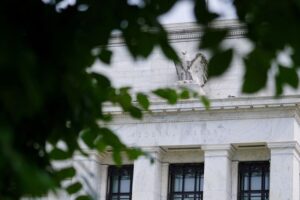Asia stocks edge up after Japan policy boost debt shi
Asia stocks edge up after Japan policy boost debt shi
HONG KONG: Asian stocks started a new month on a cautious note on Monday, with the Bank of Japan’s surprise policy easing sparking some buying but further signs of economic weakness in China and a fall in oil prices keeping investors on guard.The greenback continued to benefit from the growing monetary policy divergence between the U.S. and its counterparts in Europe and Asia while bonds, especially investment grade debt, received a boost after Japan’s surprise decision to introduce negative interest rates last week.MSCI’s broadest index of Asia-Pacific shares outside Japan edged up 0.2 percent, after losing 8 percent in January.Australia and Japan leading regional markets with gains of more than 1 percent each, while Chinese stocks slipped in early trade.”In the short term, the surprise move by Japan will be a catalyst for global equities but it only underlines the weakness of the global economy and we need to see some strong economics data for a sustainable rally,” said Cliff Tan, head of global markets research with Bank of Tokyo-Mitsubishi UFJ.Monday’s batch of economic data from China added to worries about the health of the world’s second-largest economy and only increased calls for more policy easing from China.Activity in China’s manufacturing sector contracted at its fastest pace in almost three-and-a-half years in January, missing market expectations, while growth in the services sector slowed, official surveys showed on Monday.”As deflationary pressures remain high, further reserve requirement cuts are still needed to support the slowing economy and permanently inject liquidity into the market,” ANZ strategists wrote in a note. They expect a total of 200 basis points of cuts this year with a 50 basis points cut coming in the first quarter.”In fact, refraining from further easing could risk an even weaker economy, which will then intensify depreciation expectation and capital outflows.”The Shanghai Composite Index eased 0.8 percent in early trade, while the CSI300 index of the largest listed companies in Shanghai and Shenzhen fell 0.6 percent. January was the worst monthly performance for the Shanghai market since the 2008 crisis with more than a 10 percent loss.The Bank of Japan said it would charge for a portion of bank reserves parked with the institution, an aggressive policy pioneered by the European Central Bank (ECB). Earlier in January, the ECB indicated it could cut rates further in March.”The fact that both the BOJ and the ECB suddenly showed additional easing stance after the markets’ rout suggests policymakers in Japan and Europe share concerns and take actions,” Masafumi Yamamoto, chief currency strategist at Mizuho Securities, said.In contrast, the U.S. Federal Reserve has so far stuck to the script that it will gradually raise interest rates this year even though bets have been pared back with Federal Fund rate futures pricing in barely one hike this year.Elsewhere, fixed income markets cheered a fresh round of policy easing from a major global central bank with investment grade debt in Asia ending a torrid January on a high note.In government debt, the rate-sensitive U.S. two-year yield fell to a three-month low of 0.766 percent on Friday before bouncing somewhat to 0.779 percent.The U.S. 10-year debt yield fell to 1.93 percent, edging near a double-bottom around 1.90 percent made in August-October, also helped by speculation Japanese investors will go after U.S. bonds as local bond yields plunge.On Monday the 10-year Japanese government bond yield hit a record low of 0.050 percent while the two-year yield hit a record minus 0.100 percent.Negative interest rates pressured the yen, which traded briefly at 121.38 to the dollar, near six-week low of 121.70 touched on Friday.The euro was steadier at $1.08440.Oil prices fell, with international benchmark Brent sliding 1.8 percent to $35.35 per barrel.Still, oil has bounced more than 30 percent from a 12-year low hit less than two weeks ago, taking some pressure off reeling global equity markets but that bounce is proving to be fleeting.A 19-commodity Thomson Reuters/Core Commodity CRB Index, a global benchmark for commodities edged higher and up more than 8 percent from a 13-year low hit in late January.





